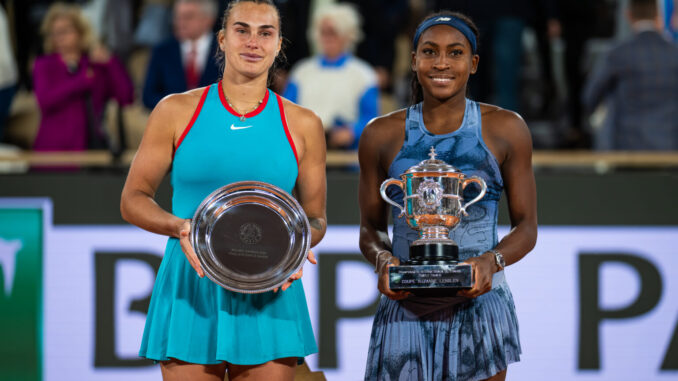
The 2025 French Open women’s final on June 7 delivered a thrilling spectacle on the red clay of Court Philippe-Chatrier, where 21-year-old Coco Gauff outlasted world No. 1 Aryna Sabalenka in a three-set epic, 6-7(5), 6-2, 6-4, to claim her first Roland Garros title. The match, a rollercoaster of momentum swings under gusty Parisian winds, saw Gauff’s tenacity triumph, but Sabalenka, in a candid post-match reflection, insisted her defeat had little to do with her opponent’s play. Instead, the Belarusian pointed to the challenging conditions and her own uncharacteristically error-strewn performance as the decisive factors, sparking debate with her blunt assessment of the “worst final” she’s ever played.
Sabalenka, chasing her fourth Grand Slam title, entered the final as the favorite after a commanding tournament run, including a semifinal upset over three-time champion Iga Swiatek. She started strongly, building a 4-1 lead in the first set with her signature power and tactical drop shots. However, the swirling winds disrupted her precision, and Gauff’s defensive prowess forced her into longer rallies. After clinching the first set in a tense 7-5 tiebreak, Sabalenka’s game unraveled. She racked up an astonishing 70 unforced errors—compared to Gauff’s 30—allowing the American to dominate the second set 6-2 and fight back from a 3-1 deficit in the third to seal the victory. “It was not about her,” Sabalenka said firmly, attributing her loss to external factors. “The conditions were terrible, and I just couldn’t find my rhythm.”
The Belarusian’s frustration was palpable as she described the match as a personal low point. “It was really honestly the worst tennis I’ve played in the last, I don’t know how many months,” she admitted, her voice heavy with disappointment. Sabalenka suggested that the windy conditions favored Gauff’s high-margin, defensive style, while her own aggressive game suffered. “She was better in these conditions than me,” Sabalenka noted, adding that Gauff’s “framing” shots—mishits that fortuitously landed in play—felt like cosmic intervention. “It felt like somebody from above was just there laughing, saying, ‘let’s see if you can handle this,’” she quipped, a rare moment of levity in her otherwise somber reflection.
Gauff, gracious in victory, acknowledged the challenging conditions but emphasized her role in the outcome. “I don’t agree with that,” she responded when told of Sabalenka’s claim that the match wasn’t about her play. “I’m here sitting here [as the champion].” Gauff’s resilience shone through as she navigated the wind and Sabalenka’s early onslaught, leveraging her speed and consistency to turn the tide. Her emotional celebration, collapsing onto the clay and kissing the Coupe Suzanne Lenglen trophy, marked a triumphant redemption after her 2022 French Open final loss. “I honestly didn’t think I could do it,” Gauff told the crowd, crediting their support for carrying her through. “You guys were cheering for me so hard, and I don’t know what I did to deserve so much love from the French crowd.”
Sabalenka’s comments stirred controversy, particularly her assertion that Swiatek, whom she defeated in the semifinals, would have beaten Gauff in the final. “No shade to Iga or anything, but last time I played her I won in straight sets,” Gauff countered, referencing her Madrid Open victory over Swiatek. The remarks drew mixed reactions, with some, like former player Rennae Stubbs, defending Gauff’s ability to capitalize on Sabalenka’s errors under pressure. Sabalenka, fighting back tears during her runner-up speech, apologized to her team for a performance she called “a joke.” “This will hurt so much,” she said, vowing to return stronger.
Despite the loss, Sabalenka’s 2025 season remains stellar, with 40 wins in 47 matches, three titles, and a third consecutive Grand Slam final. Her evolution on clay, incorporating spin and defensive play, has made her a formidable force, as evidenced by her Madrid Open title over Gauff last month. The final, the first women’s Grand Slam showdown between the top two seeds since 2018, highlighted their 5-5 head-to-head rivalry, setting the stage for future battles. “I cannot go out there every time against her in the finals of the Grand Slam and play such terrible tennis,” Sabalenka said, determined to learn from the setback.
As Gauff celebrates her $2.5 million prize and historic achievement as the first American woman to win Roland Garros since Serena Williams in 2015, Sabalenka plans a brief retreat to Mykonos for “tequila, gummy bears, and swimming” to recharge. “I just need a couple of days to completely forget about this crazy world,” she said, eyeing the grass-court season where her power could shine at Wimbledon. Sabalenka’s candid introspection and Gauff’s gracious triumph have added a compelling chapter to their rivalry, promising more fireworks as tennis shifts to the lawns of London.
Leave a Reply